词汇学论文
- 格式:wps
- 大小:39.00 KB
- 文档页数:7
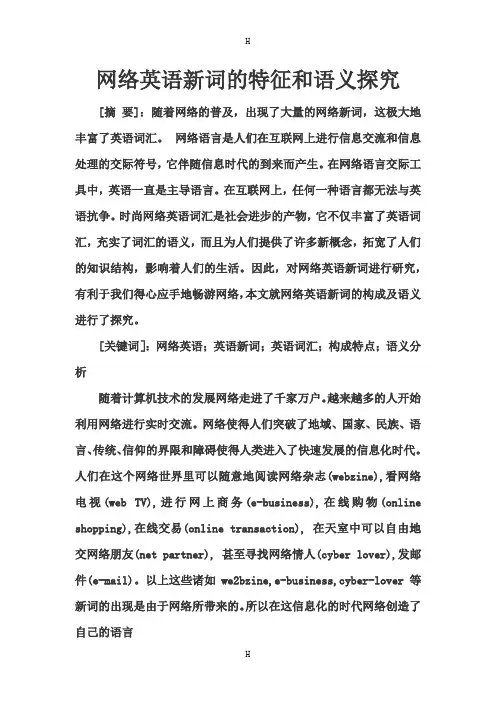
网络英语新词的特征和语义探究[摘要]:随着网络的普及,出现了大量的网络新词,这极大地丰富了英语词汇。
网络语言是人们在互联网上进行信息交流和信息处理的交际符号,它伴随信息时代的到来而产生。
在网络语言交际工具中,英语一直是主导语言。
在互联网上,任何一种语言都无法与英语抗争。
时尚网络英语词汇是社会进步的产物,它不仅丰富了英语词汇,充实了词汇的语义,而且为人们提供了许多新概念,拓宽了人们的知识结构,影响着人们的生活。
因此,对网络英语新词进行研究,有利于我们得心应手地畅游网络,本文就网络英语新词的构成及语义进行了探究。
[关键词]:网络英语;英语新词;英语词汇;构成特点;语义分析随着计算机技术的发展网络走进了千家万户。
越来越多的人开始利用网络进行实时交流。
网络使得人们突破了地域、国家、民族、语言、传统、信仰的界限和障碍使得人类进入了快速发展的信息化时代。
人们在这个网络世界里可以随意地阅读网络杂志(webzine),看网络电视(web TV),进行网上商务(e-business),在线购物(online shopping),在线交易(online transaction), 在天室中可以自由地交网络朋友(net partner), 甚至寻找网络情人(cyber lover),发邮件(e-mail)。
以上这些诸如we2bzine,e-business,cyber-lover等新词的出现是由于网络所带来的。
所以在这信息化的时代网络创造了自己的语言,形成了独具特色的新语体产生了许多新的语言现象。
网络英语以其独特的语言魅力吸引无数网民使我们的语言交流更具有时代特色。
网络语言是人们在英特网上进行信息交流和信息处理的交际符号,它随着信息时代的到来而产生。
我们知道语言最为敏感的部分是它的词汇。
美国语言学家马利奥・佩MarioPei在《2061年的英语预测》Englishin2061AForecast一文中写到“真正会使2061年的英语与今天不同的因素是大量涌现的新词。

词汇学论文英汉词汇文化内涵对比研究摘要词汇是语言的载体,是沟通和交流的基础,是文化的组成部分,同时也具有文化内涵。
文化,是语言发展的成果,是社会意识形态的集中反映,影响着社会生活,也影响着词汇的发展和变迁。
英汉词汇因所属国的文化历史国情不同而具有不同的文化内涵,集中体现在构词、语义和词义上等等。
本文通过分析对比英汉词汇文化内涵上的差异及其原因,旨在指导读者正确认识不同语言间的文化差异,更好地联系文化内涵深入地了解词汇的相关知识,从而在对语言的把握上提高一个层次。
关键词:词汇,对比,文化内涵,文化差异1. 引言人类社会在发展过程中产生了语言和文化,在语言的各个组成成分中,最能反映民族文化特征的是该民族语言的词汇,词汇背后反映的是该民族的文化认知方式。
英汉词汇因本民族的文化成就而有所差异,通过对比研究这两种语言的文化内涵,不仅可以凸显被对比语言的共性和特性,有重要的学术价值,也有利于有针对性地制定学习和教学策略,更可以为语言的综合研究提供相关资料,为词汇学的发展做出积极贡献。
2. 文化内涵2.1 文化内涵的定义英国人类学家爱德华·泰勒于1871年提出——文化是一个复合整体,包括知识、信仰、艺术、道德、法律、习俗以及作为一个社会成员的人所习得的其他一切能力和习惯。
这是以后文化被重复和扩展定义的基础。
文化具有传承性,动态性,民族性和多样性,文化作为一种历史现象,不同民族拥有不同文化,不同的文化之间既有共性又有个性。
语言作为文化的载体,语言的使用离不开作为社会河文化成员的人以及使用的语言环境。
2.2 文化与词汇的联系3.3 谚语谚语是心理,语言与文化的综合产物。
英汉中存在具有共同比喻的谚语,如:火上浇油——pour oil in the flame半斤八两——sin and half dozen破釜沉舟——burn one's boats以牙还牙——a tooth for a tooth但由于两个民族有各自独特的文化背景和各自独特的风俗习惯,思维方式,因此谚语联想,引申和比喻上有很大的不同。
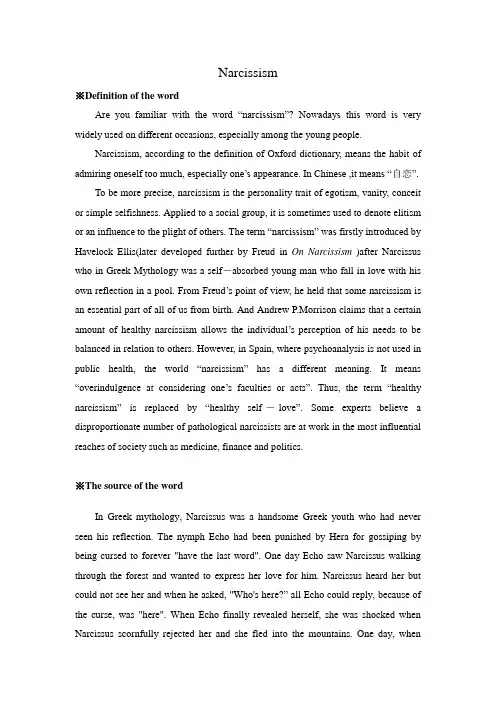
Narcissism※Definition of the wordAre you familiar with the word “narcissism”? Nowadays this word is very widely used on different occasions, especially among the young people.Narcissism, according to the definition of Oxford dictionary, means the habit of admiring oneself too much, especially one’s appearance. In Chinese ,it means “自恋”.To be more precise, narcissism is the personality trait of egotism, vanity, conceit or simple selfishness. Applied to a social group, it is sometimes used to denote elitism or an influence to the plight of others. The term “narcissism” was firstly introduced by Havelock Ellis(later developed further by Freud in On Narcissism)after Narcissus who in Greek Mythology was a self-absorbed young man who fall in love with his own reflection in a pool. From Freud’s point of view, he held that some narcissism is an essential part of all of us from birth. And Andrew P.Morrison claims that a certain amount of healthy narcissism allows the individual’s perception of his needs to be balanced in relation to others. However, in Spain, where psychoanalysis is not used in public health, the world “narcissism”has a different meaning. It means “overindulgence at considering one’s faculties or acts”. Thus, the term “healthy narcissism”is replaced by “healthy self-love”. Some experts believe a disproportionate number of pathological narcissists are at work in the most influential reaches of society such as medicine, finance and politics.※The source of the wordIn Greek mythology, Narcissus was a handsome Greek youth who had never seen his reflection. The nymph Echo had been punished by Hera for gossiping by being cursed to forever "have the last word". One day Echo saw Narcissus walking through the forest and wanted to express her love for him. Narcissus heard her but could not see her and when he asked, "Who's here?” all Echo could reply, because of the curse, was "here". When Echo finally revealed herself, she was shocked when Narcissus scornfully rejected her and she fled into the mountains. One day, whenNarcissus became thirsty and stopped by a pond to take a drink, he saw his reflection in the water for the first time. Not knowing any better, he fell in love and started talking to it. Not yet understanding reflections, Narcissus thought his reflection was speaking to him and became more engaged. Unable to consummate his love, Narcissus pined away at the pool and changed into the flower that bears his name, the narcissus.※The representatives of the wordNowadays the word “narcissism”is very popular with Chinese people. People behave narcissistically out of special reasons. For example, I have a very good friend who is a tall but fat girl. Every time when we talk about appearance, she will say in a weird but amusing voice, “well, don’t you even know that? I come from the south of China, so it’s no doubt that I’m a mild and fragile young lady.” Hearing that, I know she is a little bit narcissistic considering her real appearance. But by saying so and claiming in such a voice, she wisely avoids embarrassment and animates the atmosphere. Next time when we talk about what kind of person she is, we will unanimously say she is a wise and humorous girl instead of despising her as a narcissistic person.However, things can go quite contrary to what we have expected them to achieve if we are not capable of keeping a subtle balance when behaving narcissistically. I will give you another corresponding example. I also know a very competent person who is a member of the English debate society. He can handle different situations appropriately, but he is not popular with the other members. Why? From the other members of the association, I can figure out the reason. They just think he is too arrogant and self-conceited. Every time the other members put forward a suggestion, he is always opposed to it as if to say, “Well, my suggestion is the best, you guys can not possibly come up with a constructive idea.”Also, he is used to contending that he has good appearance, so it won’t be hard for him at all to find a girlfriend. However, he is still single now in that he even doesn’t give any chance to the girls who desperately fall in love with him. I guess the reason why he is so unpopular lies in thefact that he isn’t able to hold the appropriate degree of narcissism.※The conclusion of the wordFrom what have been mentioned above, I’m sure more or less we are familiar with the word “narcissism”, ranging from the precise definition of the word, the etymology of the word to the special occasions of using the word. Therefore, we have an overall look at the word-narcissism. However, it’s just a tip of the iceberg. If we would like to get to know more about the word, we will have to do further research so that we can apply the use of it to our daily life appropriately.Last but not the least, there is something that I would like to mention, that is, whatever our original intentions are of behaving narcissistically, we should always bear in mind that our behavior should not arouse the other people’s resentment and unhappiness. In our daily communication, we do not expect the uneasiness to generate between people, so while we are trying to be humorous by behaving narcissistically, it’s better for us to be a little bit modest.。
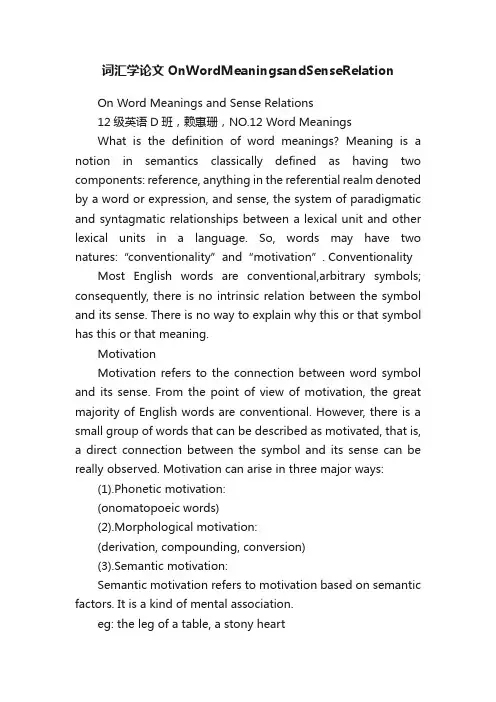
词汇学论文OnWordMeaningsandSenseRelationOn Word Meanings and Sense Relations12级英语D班,赖惠珊,NO.12 Word MeaningsWhat is the definition of word meanings? Meaning is a notion in semantics classically defined as having two components: reference, anything in the referential realm denoted by a word or expression, and sense, the system of paradigmatic and syntagmatic relationships between a lexical unit and other lexical units in a language. So, words may have two natures:“conventionality”and“motivation”. Conventionality Most English words are conventional,arbitrary symbols; consequently, there is no intrinsic relation between the symbol and its sense. There is no way to explain why this or that symbol has this or that meaning.MotivationMotivation refers to the connection between word symbol and its sense. From the point of view of motivation, the great majority of English words are conventional. However, there is a small group of words that can be described as motivated, that is, a direct connection between the symbol and its sense can be really observed. Motivation can arise in three major ways:(1).Phonetic motivation:(onomatopoeic words)(2).Morphological motivation:(derivation, compounding, conversion)(3).Semantic motivation:Semantic motivation refers to motivation based on semantic factors. It is a kind of mental association.eg: the leg of a table, a stony heartHer favorite dish is steak.He manages to earn bread.There are two main Types of Word Meaning. Word meaning is made up of various components which are interrelated and interdependent. These components are commonly described as types of meaning. Two main types of word meaning are grammatical and lexical.Grammatical meaningGrammatical meaning refers to that part of meaning which indicates grammatical relationships or concept, such as the word class, singular and plural forms of nouns,tense meaning of verbs and their inflectional forms. Words with the similarlexical meaning can have different grammatical meanings, and words with different lexical meanings can have the same grammatical meaning. Grammatical meaning is in use.Take the following as the example,(1).word-class:modern (adj) →modernize(v) →modernization(n)(2).Inlfectional paradign:cat →catswrite →writes →wrote →written →writingLexical meaningLexical meaning is the meaning of an isolated word in a dictionary. This component of meaning is identical in all the forms of the word. For example, …go, goes, went, gone, going? possess different grammatical meaning. But they have the same lexical meaning expressing the process of movement. Lexical meaning is composed of conceptual meaning and associative meaning. Lexical meaning is relatively stable.Conceptual meaning is the meaning given in the dictionaryand forms the core of word meaning. Conceptual meaning forms the basis for communication as the sameword has the same conceptual meaning to all the speakers of the same language. For example,the word …sun?means a heav enly body which gives off lights, heat and energy. …Mother? means a female parent.Associative meaning is the secondary meaning supplemented to the conceptual meaning. It differs from the conceptual meaning in that it is liable to the influence of such factors as culture, experience, religion, geographical region, class background, education, ect.What?s more, associative meaning comprises four types:Connotative meaning, stylistic meaning, affective meaning and collocative meaning.In contrast to denotative meaning, connotative meaning refers to the overtones or associations which a word suggests or implies. Take a example, …Mother? is often associated with …love?, …care?, …forgiving?,etc.Words may have stylistic features,which make them appropriate for different contexts. This stylistic difference is especially ture of synonyms. Take some example, bodily---corporal, brotherly---fraternal,etc.Affective meaning indicates the speaker?s attitude towards the person or thing in question. Words that have emotive values may fall into two categories: appreciative or commendatory and pejorative or derogatory.Collocative meaning consists of the associations a word acquires in its collocation. In other words, it is that part of the word meaning suggested by the words before or after the word in discussion. For example, …a bit or a little?collocates with wordsod negative connotations: drunk, jealous, gloomy, etc.Sense Relations between WordsWords are arbitrary symbols and are independent indentities so far as their outer facet---spelling and pronunciation,is concerned. But semantically, all words are related in one way or another, hence sence relations. In light of sense relations, words can be classified semantically.There are four types of sense relations.Hyponymy deals with the relationship of semantic inclusions. It refers to the relationship which obtains between the genus and the species,such that the former is included in the latter.Examples:color∣∣---------∣--------∣---------∣---------∣--------∣-------∣grey blue Red black white yellowSynonyms are traditionally defined as words differing in sound form but identical or similar in meaning. Synonyms are based on the denotative meaning. In every synonymous group a common denotative component brings the words together. Such an agreement in denotation is the most important criterion of Synonymy. Example: head —chief —boss —leaderstatesman —politicianTypes of synonymsRelative or partial synonyms:words which are similar or nearly the same in denotation, but embrace different shades of meaning or different degree of a given quality.Sources of SynonymsThe English language is noted for its wealth of Synonyms.“The richness of English in Synonyms is largely due tothe happy mingling of Latin, French and native elem ents.”Based on semantic similarity,synonymes are usually arranged into synonyms are usually arranged into synonymic groups or sets. Within this groups there is the most general term known as “synonymic dominant”. The synonymic dominant is the common denotational component that brings two or more words together into a synonymic group, which can be called a semantically synonymous field. Antonymy is the standard technical term for oppositeness of meaning between words. Words that are opposite in meaning are Antonyms. They are a variety of …oppositness?. They can be classified into three major groups.a.semantic contrast:rich —poorheavy —lightdeep —shallow/doc/d6*******.html,plementariesalive —deadsingle —marriedpresent —absentc.Conversiveslend —borrowtake —bringimmigrate —emigratehusband —wifeHomonymy is commonly used to refer to the linguistic phenomenon that words are identical in pronunciation, spelling, or both, but different in meaning.Modern English is exceptionally rich in homonymous words, due to the monosyllabic structure of many common Englishwords. There are roughly four times as many monosyllabic as polysyllabic homonyms.Polysemy means a single word having several or many meanings. Radiation and concatenation are the main processes leading to polysemy. Polysemic words of long standing are signs of an advanced culture. Polysemy is also an essential feature of a language?s economy and efficiency.Homonyms are words different in meaning,but identical both in sound and spelling or identical only in spelling or sound. Phonetic convergence,semantic divergence and foreign influence are the three main sources of homonymy.Polysemic and homonymous words are stylustically useful to achieve humor or irony,or to heighten dramatic effect.。
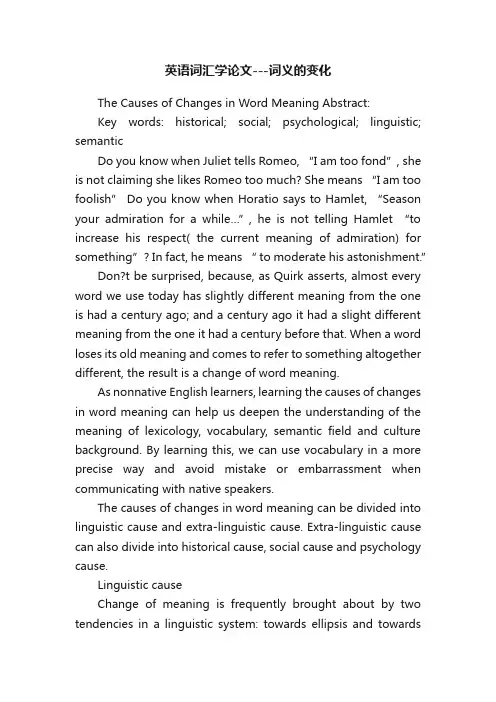
英语词汇学论文---词义的变化The Causes of Changes in Word Meaning Abstract:Key words: historical; social; psychological; linguistic; semanticDo you know when Juliet tells Romeo, “I am too fond”, she is not claiming she likes Romeo too much? She means “I am too foolish” Do you know when Horatio says to Hamlet, “Season your admiration for a while…”, he is not telling Hamlet “to increase his respect( the current meaning of admiration) for something”?In fact, he means “ to moderate his astonishment.”Don?t be surprised, because, as Quirk asserts, almost every word we use today has slightly different meaning from the one is had a century ago; and a century ago it had a slight different meaning from the one it had a century before that. When a word loses its old meaning and comes to refer to something altogether different, the result is a change of word meaning.As nonnative English learners, learning the causes of changes in word meaning can help us deepen the understanding of the meaning of lexicology, vocabulary, semantic field and culture background. By learning this, we can use vocabulary in a more precise way and avoid mistake or embarrassment when communicating with native speakers.The causes of changes in word meaning can be divided into linguistic cause and extra-linguistic cause. Extra-linguistic cause can also divide into historical cause, social cause and psychology cause.Linguistic causeChange of meaning is frequently brought about by two tendencies in a linguistic system: towards ellipsis and towardsanalogy. Some linguists think foreign influence should subordinate linguistic cause.Ellipsis occurs when a phrase is shortened to one word which retains the meaning of the whole, so it often occurs in habitual collocations, such as adjective + noun or attributive noun + noun. Private, daily, duplicate are all adjectives, but they are used as nouns. Private means a soldier of the lowest rank, daily means daily newspaper, and duplicate means duplicate copy. Under such circumstances, whatever is left, whether a noun or an adjective, is all used as a noun assuming the original meaning. Naturally, the association became so close that the first element could alone carry the meaning of the whole phrase.Besides, there is a change of grammatical function as well, as when adjectives assumethe roles of nouns. Unlike the above examples, whose sense of one word has been transferred to another simple because the two occur together habitually, in some cases, it is the second or “headword”of the phrase that remains. For example, (stream) engine, (coal) gas and (light) bulb.The analogical tendency means new meanings developed in one part of speech are passed on to other parts of speech from the same lexical bas e. Fortuitous formerly denoted …happening by chance?, …accidental?, and later took on the meaning …fortunate?probably by analogy because the two words look similar in shape. Another interesting example is fruition, originally from a Latin word fruitio meaning enjoyment. But now, its meaning is given as “fulfillment of (plans, desired results, aims, etc.),”possibly from connection with the word fruit.Foreign influencesA particularly important cause of change of meaning inwords has been the influence of foreign words. For example, the native word stool originally meant any kind of seat for one person, and could even be used for a king?s seat. It got its humble meaning because the French word chair was adopted to denote a more comfortable piece of furniture. Other example is dream. Dream meant “joy” in OE; it gets its modern sense from the related Scandinavian word draumr.Historical causeIt often happens that though a word retains its original form, its meaning has changed because the object which it denotes has changed. This is the historical cause of semantic change.The well-known semanticist Ullmann notes, “It often happens that language is more conservative than civilization, material as well as moral. Objects, institutions, ideas, scientific concepts change in the course of time; yet in many cases the name is retained and thus helps to ensure a sense of tradition and continuity.”(Ullmann 1997:198)Indeed, it often happens that a word is retained for a name though the meaning has changed because the referent has changed. Take pen for example, it donated …feather?, which was used in the West as pen in old times. Now, the time when …feather? served as pen is long gone, and people are using hall-point pens and fountain pens, yet the name is still kept. This change has also occurred to computer, which designated a …person who computes? in the past. At present, when we talk about computer, people, people would think of an …electronic machine? rather than a person.There are also many scientific concepts which have retained their original forms, although their meanings have changed as a result of new scientific discoveries and increased knowledge. Forinstance, before Copernicus, the sun was thought to be …the luminous celestial body that in the Plolemaic system is one of the seven planets revolving around the earth? and this meaning is retained in “The sun rises and sets.”The Copernician theory tried to change the historical point of view and now everyone knows that the sun is a …star around which the earth a nd other planets revolve…?Social causeWe are going to discuss social cause of the changes of words?meanings in five aspects.A. Social developmentChange in word meaning resulting from a constant verbal traffic between common word and various technical words is referred to as social cause of semantic change. (Ullmann 1997:199-200) As a result, some technical words have lost their specialized meanings and have come to be used in more general senses, which connect with electricity, physics, chemistry, medicine, mathematics, etc. For instance, feedback means “response” in common use, as in “The teacher likes to have feedback from his students.”Dimension: as a common word, it means “extent in a particular aspect”, as in “This problem has a new dimension.”B. Social environmentBig events in society will change the meaning of some words. The simple words cold and hot have changed their meanings in the field of politics, as in “cold war” and “hot war”. In England, Abdication can mean King Edward VIII abdicated for marrying a divorced American woman, Ms Simpson. In these cases, nonnative speakers should try to memorize.C. Social classVillain means bad people, but its original meaning is villager.Because the aristocrat looks down upon the low social status villagers, the meaning of villain changed. It is a kind of degeneration of meaning. More examples are clown, boor, knave, and churl. Thus, if a word has something to do with low social status, it will have derogatory sense, vice versa.D National sentimentNational sentiment influences the meaning of word deeply. In English, some bad things will have connection with other nations. For instance, to take French leave means leaving without saying goodbye. Italian hand means interfere. Spanish athlete means a person who says nonsense.The most obvious nation, to which English shows great prejudice, is Netherlands, because these two countries always fought each other in 17century. Dutch act means commit suicide. Dutch comfort means comfort of no help. Dutch widow means prostitute. Dutch uncle means strict critic. Dutch treat means a party that you should pay for yourself. Dutch bargain means a deal made when you are drunk. I amDutched means I am cheated. Double Dutch means words that are rather baffling. I’m a Dutch man if …E. SexismThere are some words with sexism in English, but the number is minor. For example, “Man is a rational animal; men are born equal.”The man in there refers to human being. Recent years, thanks to feminist movement, more and more words are created to refer to women, such as businessperson, draftsperson, poetess, heroine, spokeswoman etc.Psychological causePsychological cause is also constantly at work in bringing about changes in word meaning. Psychological factors play abasic part in meaning change, which leads to the elevation or degradation of word meanings. It takes three forms: euphemism, grandiloquence and cynicism.A.EuphemismPeople change word-meaning owing to various psychological motives: love, respect, courtesy, suspicion, pessimism, irony, contempt, hatred, etc. People tend to use mild, agreeable language when speaking of an unpleasant or embarrassing fact and taboo subjects.Death and things related to death are one of the most common objects of euphemism. “To pass away,”“to brea the one?s last,”“to cease to think,”“to fall asleep,”“to kick the bucket,”“to be no more,”“to go west,” all refer to death.Toilet is another example. Rest room, lounge, convenience, comfort station and powder room are just some of its euphemism. Pregnant can be said “big,”“big with child,”“expectant,”“heavy with child,”“laden,”“anticipating,”“in the family way,”and “in an interesting condition.”B.GrandiloquenceGrandiloquence refers to the use of long, important-sounding words for effect. The desire to upgrade or raise the social status of a position, occupation, or institution by changing its common name to one felt to confer greater dignity or importance is another psychological factor in the change of word meaning.In American English, there are so many words of grandiloquence used in unpopular jobs. Garbage collector is sanitation engineer, servant is domestic engineer, mortician is funeral director and gardener is landscape architect.In a sense, grandiloquence is a form of euphemism, too. So some linguists consider grandiloquence subordinate the Euphemism.C.CynicismCynicism is the desire to sneer and to be sarcastic. For instance, the word pious may mean “hypocritically virtuous” in addition to its primary meaning, “having, showing deep devotion to religion.” The present meaning of sanctimonious is “pretending to be very holy or pious”, while it once meant “devout, holy or sacred”. Fanatic, a Latin synonym for enthusiastic, means “unreasonably enthusiastic, almost approaching to madness.”ConclusionChange in word meaning is commonplace and fundamental in a living language, for it is one of the simplest and most convenient ways of meeting peoples? need for new manes to refer to new things, ideas, processes, etc. Broadly speaking, change of meaning refers to the alteration of the meaning of existing words, as well as the addiction of new meaning to established words.The causes of semantic change are historical, social, psychological or purely linguistic. As nonnative English learners, we need to pay more attention to the changes of word meanings, for we are not familiar with their own history, their culture background and psychological situation. Only by learning these causes can we get a better understanding of lexicology, vocabulary, semantic field and context. Only by learning these causes can we know which words should be used and which words should be avoided, so that we can express our meaning more specific in communication with others.Bibliography:Jackson Howard (2000), Words, Meaning and V ocabulary, Trowbridge: The Cromwell PressJavier E Diaz Verd (2004), Lexicography, Semantics and Lexicology in English Historical Linguistics, Netherlands: Rodopi 汪榕培(2000),《英语词汇学研究》,上海:上海外语教育出版社汪榕培& 卢晓娟(2006),《英语词汇学教程》,上海:上海外语教育出版社杨艳华& 张树凡(2007),《现代英语词汇学》,:冶金工业出版社张维友(1997),《英语词汇学教程》,武汉:华中师范大学出版社张韵斐(2012),《现代英语词汇学概论》,北京:北京师范大学出版社。

词汇学习论文现象及问题论方法与策略论文文词汇学习论文现象及问题论方法与策略论文文浅谈英语词汇的学习和记忆【摘要】英语学习中,词汇占有较大的比重。
英语词汇数量庞大,记忆困难,使用时也较为复杂。
文章从学习词汇的重要性和词汇学习的常见现象及问题出发,分析词汇特点,搜集整理了一些记忆方法。
【关键词】词汇学习现象及问题方法与策略在英语学习的过程中,词汇的匮乏直接影响语言能力的进一步提高,这在很大程度上影响了学生进一步学习英文的信心和决心,词汇的记忆和运用也就成为英语学习中的一个较大障碍。
事实上,英语词汇量大,很难记忆,即便是认真学习了,遗忘率也较高;而勉强记住的词汇,学生们却也不能完全正确使用。
因此,如何学习、记忆词汇并能正确运用成为了英语学习中学习者亟待解决的问题。
一词汇学习的重要性据国外权威机构测定,词汇低于6000时,语言者在进行读写及交际时会遇到巨大障碍。
而我国中学生毕业时一般只能掌握大约2000个单词。
语言学家mccarthy指出,不管一个人的语法学得多好,如果没有足够的词汇,他就无法表述自己的感情或理解对方的观点,也就无法与别人交流。
许多从事外语教学的语言学家也认同词汇在外语教学中的重要作用。
因为人们在表述某一事件时,只有通过丰富的语言,才能正确表达自己的思想和感情等。
也就是说,交际的核心不是句子平面以上的知识,而是语言知识,而词汇是核心的核心。
二词汇学习过程中常见的几种现象和问题1.同音词或近音词英语词汇中,有较大一部分词汇读音相同或相近;若是不加以注意或拼读不准确,也会影响到词汇的正确书写和运用。
如two to two (两点差两分);farther和father等等读音近或相同,而意思却有天壤之别。
2.形近词这主要表现在写作的过程中,如adapt和adopt、power和powder、ant和aunt等等;另一种情况就是不能正确运用词汇,一个词稍有变化就不能理解了,而英文词汇只有一个词性的词较少,大部分词汇都有两个或两个以上词性。
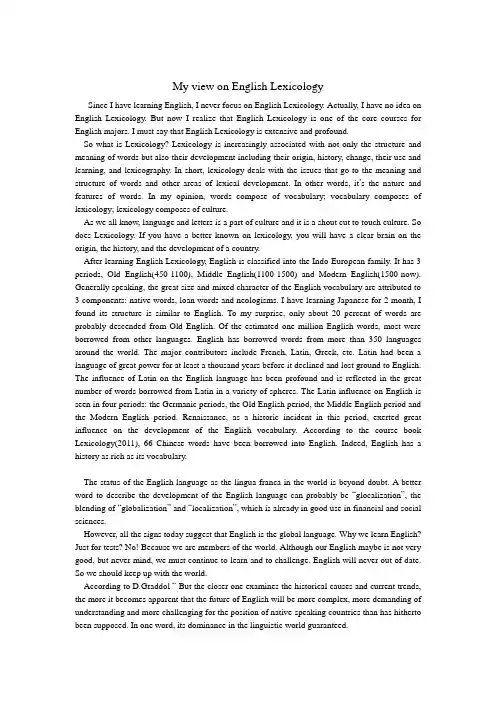
My view on English LexicologySince I have learning English, I never focus on English Lexicology. Actually, I have no idea on English Lexicology. But now I realize that English Lexicology is one of the core courses for English majors. I must say that English Lexicology is extensive and profound.So what is Lexicology? Lexicology is increasingly associated with not only the structure and meaning of words but also their development including their origin, history, change, their use and learning, and lexicography. In short, lexicology deals with the issues that go to the meaning and structure of words and other areas of lexical development. In other words, it’s the nature and features of words. In my opinion, words compose of vocabulary; vocabulary composes of lexicology; lexicology composes of culture.As we all know, language and letters is a part of culture and it is a shout cut to touch culture. So does Lexicology. If you have a better known on lexicology, you will have a clear brain on the origin, the history, and the development of a country.After learning English Lexicology, English is classified into the Indo-European family. It has 3 periods, Old English(450-1100), Middle English(1100-1500) and Modern English(1500-now). Generally speaking, the great size and mixed character of the English vocabulary are attributed to 3 components: native words, loan words and neologisms. I have learning Japanese for 2 month, I found its structure is similar to English. To my surprise, only about 20 percent of words are probably descended from Old English. Of the estimated one million English words, most were borrowed from other languages. English has borrowed words from more than 350 languages around the world. The major contributors include French, Latin, Greek, etc. Latin had been a language of great power for at least a thousand years before it declined and lost ground to English. The influence of Latin on the English language has been profound and is reflected in the great number of words borrowed from Latin in a variety of spheres. The Latin influence on English is seen in four periods: the Germanic periods, the Old English period, the Middle English period and the Modern English period. Renaissance, as a historic incident in this period, exerted great influence on the development of the English vocabulary. According to the course book Lexicology(2011), 66 Chinese words have been borrowed into English. Indeed, English has a history as rich as its vocabulary.The status of the English language as the lingua franca in the world is beyond doubt. A better word to describe the development of the English language can probably be “glocalization”, the blending of “globalization” and “localization”, which is already in good use in financial and social sciences.However, all the signs today suggest that English is the global language. Why we learn English? Just for tests? No! Because we are members of the world. Although our English maybe is not very good, but never mind, we must continue to learn and to challenge. English will never out of date. So we should keep up with the world.According to D.Graddol “ But the closer one examines the historical causes and current trends, the more it becomes apparent that the future of English will be more complex, more demanding of understanding and more challenging for the position of native-speaking countries than has hitherto been supposed. In one word, its dominance in the linguistic world guaranteed.。
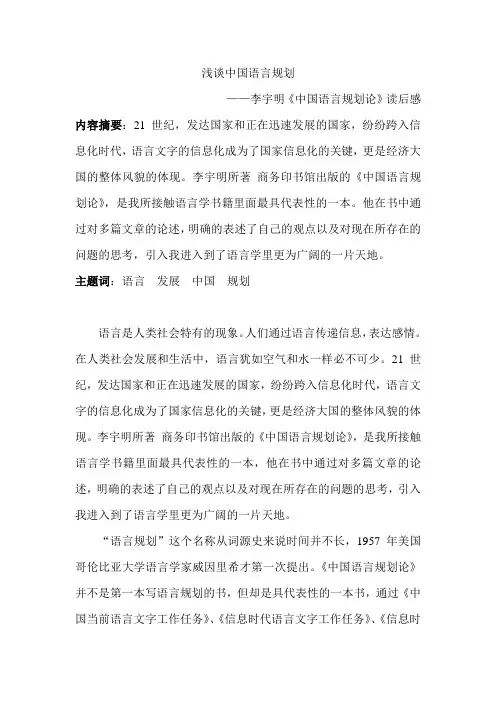
浅谈中国语言规划——李宇明《中国语言规划论》读后感内容摘要:21世纪,发达国家和正在迅速发展的国家,纷纷跨入信息化时代,语言文字的信息化成为了国家信息化的关键,更是经济大国的整体风貌的体现。
李宇明所著商务印书馆出版的《中国语言规划论》,是我所接触语言学书籍里面最具代表性的一本。
他在书中通过对多篇文章的论述,明确的表述了自己的观点以及对现在所存在的问题的思考,引入我进入到了语言学里更为广阔的一片天地。
主题词:语言发展中国规划语言是人类社会特有的现象。
人们通过语言传递信息,表达感情。
在人类社会发展和生活中,语言犹如空气和水一样必不可少。
21世纪,发达国家和正在迅速发展的国家,纷纷跨入信息化时代,语言文字的信息化成为了国家信息化的关键,更是经济大国的整体风貌的体现。
李宇明所著商务印书馆出版的《中国语言规划论》,是我所接触语言学书籍里面最具代表性的一本,他在书中通过对多篇文章的论述,明确的表述了自己的观点以及对现在所存在的问题的思考,引入我进入到了语言学里更为广阔的一片天地。
“语言规划”这个名称从词源史来说时间并不长,1957年美国哥伦比亚大学语言学家威因里希才第一次提出。
《中国语言规划论》并不是第一本写语言规划的书,但却是具代表性的一本书,通过《中国当前语言文字工作任务》、《信息时代语言文字工作任务》、《信息时代的中国语言问题》《语言学发展的新机遇》、《信息时代需要更高水平的语言文字规范》等多篇文章的论述,清楚的描述了自己的见解并阐述了时代赋予我国语言文字工作者的神圣使命。
同时他的文章是站到时代高端去审视国家的语言问题。
更值得我深深地了解到真谛。
1《中国语言规划论》的内容特点1.1站位高,展现强烈的时代气息,这是《中国语言规划论》一书的一个重要特点。
中国正在向经济大国阔步迈进,中国的语言文字工作者必须站到时代潮头,与时俱进的思考自己的工作如何让才能跟历史车轮同进。
一些“传统任务”的完成,比如普通话的推广、现行汉字的整理和汉语拼音方案的推行,也应提升到信息化的高度来统筹规划。
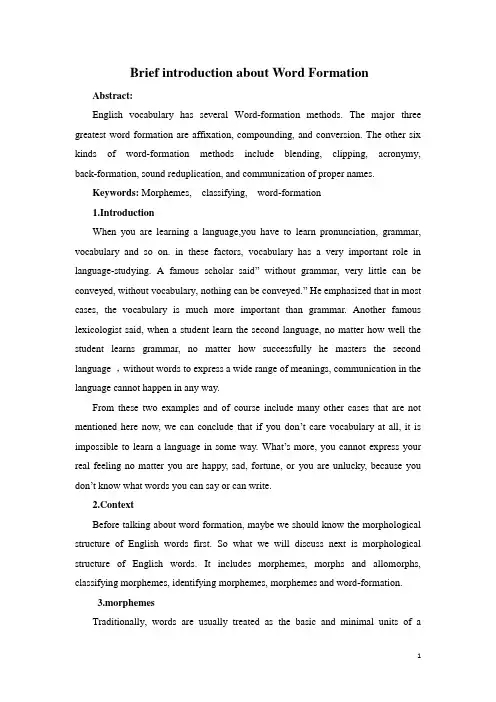
Brief introduction about Word Formation Abstract:English vocabulary has several Word-formation methods. The major three greatest word formation are affixation, compounding, and conversion. The other six kinds of word-formation methods include blending, clipping, acronymy, back-formation, sound reduplication, and communization of proper names.Keywords: Morphemes, classifying, word-formation1.IntroductionWhen you are learning a language,you have to learn pronunciation, grammar, vocabulary and so on. in these factors, vocabulary has a very important role in language-studying. A famous scholar said”without grammar, very little can be conveyed, without vocabulary, nothing can be conveyed.” He emphasized that in most cases, the vocabulary is much more important than grammar. Another famous lexicologist said, when a student learn the second language, no matter how well the student learns grammar, no matter how successfully he masters the second language ,without words to express a wide range of meanings, communication in the language cannot happen in any way.From these two examples and of course include many other cases that are not mentioned here now, we can conclude that if you don’t care vocabulary at all, it is impossible to learn a language in some way. What’s more, you cannot express your real feeling no matter you are happy, sad, fortune, or you are unlucky, because you don’t know what words you can say or can write.2.ContextBefore talking about word formation, maybe we should know the morphological structure of English words first. So what we will discuss next is morphological structure of English words. It includes morphemes, morphs and allomorphs, classifying morphemes, identifying morphemes, morphemes and word-formation.3.morphemesTraditionally, words are usually treated as the basic and minimal units of alanguage to make sentence, which are combinations of words according to syntactic rules. Structurally, however, a word is not the smallest unit because many words can be separated into even smaller meaningful units. These minimal meaningful units are known as morphemes. In view of word-formation, the morpheme is seen as ‘the smallest functioning unit in the composition of words’. Syntactically, however, a morpheme is the minimal form of grammatical analysis.Morphemes are abstract units, which are realized in speech by discrete units known as morphs. They are actual spoken, minimal carriers of meaning.Morphemes vary in function. Accordingly, we can classify morphemes into several general categories:① Free versus Bound Morphemes ---- morphemes which are independent of other morphemes are free. These morphemes have complete meanings in themselves and can be used as free grammatical units in sentences. Morphemes which cannot occur as separate words are bound. They are so named because they are bound to other morphemes to form words or to perform a particular grammatical function.②Derivational versus Inflectional Morphemes ---- morphemes which are used to derive new words are known as derivational morphemes because when these morphemes are conjoined, new words are derived.③ Content versus Grammatical Morphemes ---- On a semantic and syntactic basis, morphemes can fall into content and grammatical morphemes. Content morphemes are lexical morphemes which are used as we see above to derive new words, so also known as derivational morphemes.4.Morphemes and Word-formationWe know that words can be analyzed into morphemes, which are the minimal meaningful units in the composition of words. In word-formation formation, however, morphemes are conventionally labeled root, stem, base and affix.Affixes are forms that are attached to words or elements to modify meaning or function. Affixes are bound morphemes because none of them can stand as words in their own right. According to the functions of affixes, we can divide them into inflectional affixes and derivational affixes. Derivational and inflectional affixes areidentical with derivational and inflectional morphemes. In view of their distribution in the formation of word, affixes can fall into prefix and suffix.Before we begin our actual discussion of word-building processes, there are some basic concepts that need clarifying:1.Root: a root is the basic form of a word which cannot be further analyzedwithout total loss of identity.2.Stem: a stem may consist of a single root morpheme or of two rootmorphemes. It can be a root morpheme plus one or more affixational morphemes.3.Base: a base is referred to a form to which affixes of any kind can be added. Itcan be a root or a stem.5.Word FormationThe expansion of vocabulary in modern English depends chiefly on word formation. There is a variety of means being at work now. The most productive are affixation, compounding and conversion.⑴AffixationAffixation is generally defined as the formation of words by adding word-forming or derivational affixes to base. This process is also known as derivation, by which new words are derived from old or base forms. The words created in this way are called derivatives. According to the positions affixes occupy in words, affixation falls into two subcategories: prefixation and suffixation.Prefixation includes:Negative Prefixes (a-, dis- ,in-, non-, un-…)Reversative or Privative Prefixes (de-, dis-, un,…)Pejorative Prefixes (mal-, mis-, pseudo- …)Prefixes of Degree or Size (arch-, co-, extra-, hyper-, macro-, micro-, mini-,out-, over-, sub-, super-, sur-, ultra-, under- …) Prefixes of Orientation and Attitude (anti-, contra-, counter-, pro-…)Locative Prefixes ( fore-, inter-, intra-, super-, tele-, trans-…)Prefixes of Time and Order ( ex-, fore-, post-, pre-, re- …)Number Prefixes ( bi-, multi-, semi-,tri-,uni- …)Conversion Prefixes ( a-, be-, en- …)Miscellaneous Prefixes ( auto- , neo-, pan-, proto-, vice- …)Suffixation includes:Noun suffixes (denominal nouns, deverbal nouns, de-adjective nouns, non andadjective suffixes)Adjective suffixes (denominal suffixes, deverbal suffixes )Adverb suffixes (Omit example)Verb suffixes (Omit example)⑵CompoundingCompounding is the formation of new words by joining two or more bases. Wordsworth formed in this way are called compounds. Compounds can be written solid, hyphenated and open.1.Characteristics of compoundsCompounds have noticeable characteristics which may in most cases differentiate themselves from noun phrases in the following four aspects:Phonological features, semantic features, grammatical, orthographical features.2.Formation of compoundsCompounding can take place within any of the word class, but the productive ones are nouns and adjectives followed by verbs to a much lesser extent.Noun compounds, adjective compounds, verb compounds.⑶ConversionConversion is the formation of new words by converting words of one class to another class. Conversion is generally considered to be a derivational process whereby an item is adapted or converted to a new word class without the addition of an affix. Hence the name zero-derivation. Words produced by conversion are primarily nouns, adjectives, and verbs.Conversion to nouns (deverbal, de-adjectival, miscellaneous conversion )Conversion to verbs (denominal, de-adjectival, miscellaneous conversion )conversion to adjectives (voiceless to voiced consonant, initial to end stress)Annotation:《英语词汇学教程》张伟友著,《词汇学学习指南》杨春慧著。
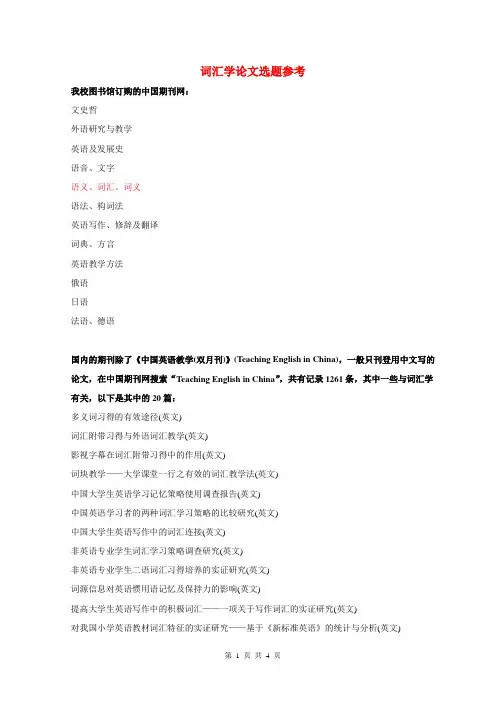
词汇学论文选题参考我校图书馆订购的中国期刊网:文史哲外语研究与教学英语及发展史语音、文字语义、词汇、词义语法、构词法英语写作、修辞及翻译词典、方言英语教学方法俄语日语法语、德语国内的期刊除了《中国英语教学(双月刊)》(Teaching English in China),一般只刊登用中文写的论文,在中国期刊网搜索“Teaching English in China”,共有记录1261条,其中一些与词汇学有关,以下是其中的20篇:多义词习得的有效途径(英文)词汇附带习得与外语词汇教学(英文)影视字幕在词汇附带习得中的作用(英文)词块教学——大学课堂一行之有效的词汇教学法(英文)中国大学生英语学习记忆策略使用调查报告(英文)中国英语学习者的两种词汇学习策略的比较研究(英文)中国大学生英语写作中的词汇连接(英文)非英语专业学生词汇学习策略调查研究(英文)非英语专业学生二语词汇习得培养的实证研究(英文)词源信息对英语惯用语记忆及保持力的影响(英文)提高大学生英语写作中的积极词汇——一项关于写作词汇的实证研究(英文)对我国小学英语教材词汇特征的实证研究——基于《新标准英语》的统计与分析(英文)实词搭配与语法搭配,哪个能力更弱些?(英文)跨语言间搭配差异与英语词汇教学(英文)英语专业本科生一外和二外词汇学习观念策略对比研究(英文)高水平大学学生词汇知识发展实证研究(英文)词源信息对英语惯用语记忆及保持力的影响(英文)根据语料库看高级学习者词典中的relation和relationship(英文)中、日大学生英语词汇知识剖析(英文)单词接触频率对中国学生顺带式习得英语词汇的影响(英文)“语义、词汇、词义”方面的中文论文更多,例如:意义的七种类型和英语词汇教学朱亚夫外语与外语教学2005/09文化在英语新词构成中的表现_试析_gate及其合成词语杨永林西北师大学报1997/01英语和汉语中有关“猫”和“狗”的习语比较何云亭四川理工学院学报(社会科学版) 2006/S2中英网络聊天用语词汇分析阮丽吉林广播电视大学学报2006/03英汉拟声词对比万石建外语研究2006/05动词happen、occur和“发生”的语言差异性探究——一项基于英汉语料库的调查与对比分析张继东外语研究2006/05论英汉词汇的显性和隐性性别歧视张伟香湘潭师范学院学报(社会科学版) 2006/06语用原则对分析英语幽默的作用——兼论《老友记》的语用幽默李蜜蜜文教资料2006/30从框架理论看词汇语码转换陈蕾牡丹江教育学院学报2006/05汉英称谓语的文化解读李英洛阳大学学报2006/03基于语料库的中国新闻英语主题词研究高超北京第二外国语学院学报2006/06析英语广告文体的词汇特点梁萍职大学报2006/03英汉“生理现象”委婉语对比探析赵娟娟阜阳师范学院学报(社科版) 2006/04基于语料库的英语近义词辨析陈琳三峡大学学报(人文社会科学版) 2005/S1英语中的性别语言黄天琪职业技术2006/12现代美语词汇发展的几个趋势戴卫平四川理工学院学报(社会科学版) 2006/02英汉网络词汇构建方式的比较研究泮幼萍现代语文(语言研究版) 2006/05论英语中女性语言的特点和对女性的语言性别歧视现象李红艳中山大学研究生学刊(社会科学版) 2005/02英语数字习语的文化探源李丽西安欧亚学院学报2005/04英语习语的文化内涵(英文) 贾秀珍无锡南洋学院学报2006/02说“PK” 李明霞现代语文(语言研究版) 2006/05英语成语及其变体的理解策略(英文) 魏汝尧Teaching English in China-CELEA Journal 2005/06 语料库对同义词研究的贡献(英文) 卢鹿Teaching English in China-CELEA Journal 2005/06基于成分分析框架的二语词汇教学贺义辉泸州职业技术学院学报2006/01英语课程标准词汇统计分析杨春陇东学院学报(社会科学版) 2006/01美国英语中黑人英语变体的研究王妍江苏外语教学研究2005/01网络英语中的俚语张子琴英语知识2006/07莎士比亚与英语词汇(43) 杨俊峰英语知识2006/07英语短语动词语义构成的认知探索王朝培西南民族大学学报(人文社科版) 2006/09浅谈英语词汇中的借词崔萍铜陵职业技术学院学报2006/02莱可夫隐喻理论探析——来自当代英语词汇隐喻语料库的检验章国新莆田学院学报2006/04 英汉词汇互借对语言文化的影响甘成英绵阳师范学院学报2006/03美语俚语的发展及其特点杜皓高等教育与学术研究2006/03注意“颜”外之意Simon 今日中学生2006/26英语形容“漂亮女孩”知多少同学2006/05英语成语折射出的英国民族文化特点黄丽辉康定民族师范高等专科学校学报2006/03常用电影俚语词汇集萃钱乐奕海外英语2006/Z2美国生活俗语看过来高素菊海外英语2006/Z2语用预设——美国2000年总统大选第二场辩论分析徐黄丽文教资料2006/21网络英语新词词义探析杜彦强昆明师范高等专科学校学报2006/02浅谈计算机英语的词汇特点莫佳科技广场2006/05浅析现阶段英语外来语词“汉语化”现象邹妍高等教育与学术研究2006/01通过因特网进行英语词汇教学策略(英文) 金长革鞍山师范学院学报2006/03新闻英语中的汉语借词谭梦玲文教资料2006/14从英语中汉语借词看中国文化的影响陶岳炼台州学院学报2006/02浅析希腊神话对英语词汇的影响吴光亭绥化学院学报2006/02对英语词语新义的研究高永伟上海翻译2006/02从英语谚语看英格兰民族的爱情观、婚姻观惠燕徐州工程学院学报2006/05英语有关“笑”的词汇谭新星中国科技翻译2006/02英汉习语文化历史溯源刘宁吉林工程技术师范学院学报2006/02浅谈英汉植物词语的文化涵义和翻译汪莹景德镇高专学报2006/01英汉动物词的文化内涵差异及其翻译单瑶景德镇高专学报2006/01禁忌语的运用与《泰坦尼克号》王琼湖北成人教育学院学报2006/03英汉词汇空缺类型及成因的文化分析赵文学长春师范学院学报2006/05对汉英动物义位陪义的对比研究于屏方语文学刊2006/03澳大利亚英语的词汇特色张沉香外语教学2006/02Jackendoff概念语义学述评刘晓林外语教学2006/02澳大利亚英语的语言特点黄秀兰汕头大学学报(人文科学版) 1994/04英国英语与美国英语的词汇差异对比研究隋志娟中国成人教育2006/01独具特色的澳大利亚英语张煤外语与外语教学1995/03澳大利亚、新西兰英语的特点刘国辉四川师范学院学报(哲学社会科学版) 1995/01 澳大利亚英语词汇中折射出的澳大利亚历史孙雁广西大学梧州分校学报2004/02 新西兰英语的特点刍议王永祥张家口师专学报1994/02美国英语与英国英语的语音差异张蜀青岛远洋船员学院学报1995/03。
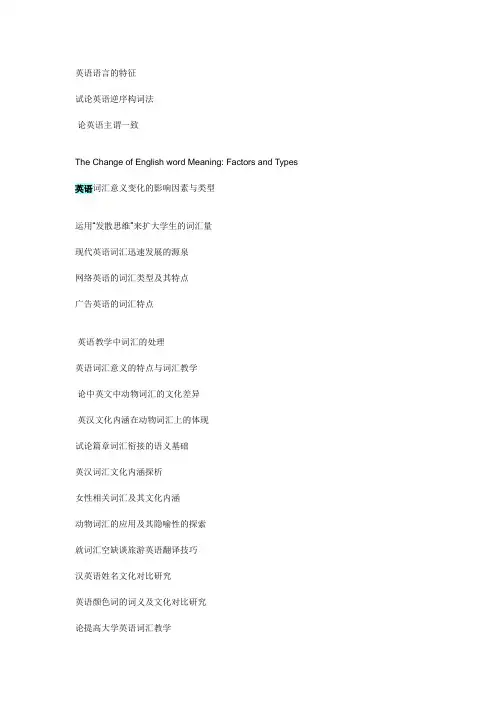
英语语言的特征
试论英语逆序构词法
论英语主谓一致
The Change of English word Meaning: Factors and Types 英语词汇意义变化的影响因素与类型
运用“发散思维”来扩大学生的词汇量
现代英语词汇迅速发展的源泉
网络英语的词汇类型及其特点
广告英语的词汇特点
英语教学中词汇的处理
英语词汇意义的特点与词汇教学
论中英文中动物词汇的文化差异
英汉文化内涵在动物词汇上的体现
试论篇章词汇衔接的语义基础
英汉词汇文化内涵探析
女性相关词汇及其文化内涵
动物词汇的应用及其隐喻性的探索
就词汇空缺谈旅游英语翻译技巧
汉英语姓名文化对比研究
英语颜色词的词义及文化对比研究
论提高大学英语词汇教学
浅析词汇的记忆与词的形态理据之问的关系
试析英语中的歧义现象
大学英语词汇教学的有效方法2095 英语词汇教学新探英语词汇的联想与搭配探析
英汉词汇比较中文化内涵的展现
英汉词汇的文化差异
隐喻对英语词汇演变的影响
隐喻认知理论对英语词汇教学的启示
论英语词汇搭配的特征
言语听辨中的词汇提取
英语词汇的认知与活用。
浅谈现代汉语词汇中的术语问题摘要:社会语言学认为,语言不是一个静止的、自给自足的、同质的、观念的符号系统,受社会各种因素的影响,它总是处于不断变化、发展的过程中。
随着现代汉语的发展,有些词语开始进入其他应用领域,同时产生了与原来词义有所差异的意义和用法,这些意义和用法在词语内涵、外延及感情色彩方面都有了新的变化,从而产生词义泛化,并成为人们关注的一种新语言现象。
本文试图在对其界定的基础上,探讨术语泛化的动因、途径、意义及其未来发展趋势。
关键词:术语泛化词汇一、什么是术语泛化术语是在特定学科领域用来表示概念的称谓的集合,在我国又称为名词或科技名词。
术语是通过语音或文字来表达或限定科学概念的约定性语言符号,是思想和认识交流的工具。
术语泛化,是指将术语用于该学科或专业领域以外的语境以及用在日常生活的语境。
术语一般具有单一性和专业性,但有很多学科、行业的术语创造性的用在其他语境,经过多次使用而产生新的意项,扩大了适用范围,突破了其固有的单义性和专业性,从而导致了术语的泛化。
例如上文提到的“充电”一词,原意是把直流电源接到蓄电池的两级上使充电池获得放电能力。
而泛化使用之后则可用来指通过学习补充知识、提高技能。
例如:为了适应新形势的发展,每个人都需要通过不断学习充电来提高自己的能力。
这样的例子还有很多:渗透、把脉、解剖、缩水、冲浪、大出血、黑洞、透明度、克隆、擦边球、跳水、独角戏、并轨、接轨、触电、打造、下课……等词都属于术语的泛化。
二、术语泛化的原因术语通过泛化产生多义性和普遍性,从而进入共同语词汇系统。
其泛化的动因。
可以从三个方面:从语言的使用者来看;从语言结构本身来看;从术语泛化的表达效果来看。
(1)从语言的使用者来看。
当今社会活跃的语言使用者,包括青年学生、作家、学者、记者编辑和节目主持人以及广大普通民众,他们的知识背景较为深广,科学文化素养不断提高,思维日趋活跃。
求新求异欲望强烈.这些为术语的泛化架起了一座桥梁。
Abstract词汇是我们在英语学习过程中最大的障碍。
然而,英语构词法能够帮助我们很好的辨别并正确理解英语,同时也可以在短时间内增加我们的词汇量,英语构词法是学习英语的有效途径和强有力的“武器”,在所有的英语构词法中,词缀法能够生成的新单词是最多的也是最广泛,它被认为英语学习的最佳途径之一.除了词缀发以外,复合法、转类法、混成法、截短法、首字母拼音法、逆向构词法也都是英语学习的有效途径Vocabulary is one of the main obstacles of English study. However English word formation can help us recognize English words,understand them correctly, and enlarge our vocabulary quickly. It is an efficient way and powerful weapon for English study. Among them,affixation is the strongest one to form a great range of vocabulary, and it is claimed to be one of the best ways of learning English。
Besides,compounding,conversion,blending,clipping, acronyms, back—formation are also efficient ways of learning English. In the paper the ways and characteristics of word formation is analyzed form these aspects: affixation, compounding,conversion,blending.Key words: English,lexicology,word formation,affixation(关键字:英语、词汇学,构词法,词缀法)IntroductionThe expansion of vocabulary in modern English depends chiefly on word formation. There is a variety of means being at work now. The most productive are affixation,compounding and conversion. Talking about word formation patterns means dealing with rules。
abstract摘要语言具有民族性,它是表明一个民族的归属和认同的特征。
美国英语是英语的一种变体,是近四百年来英语使用于北美这个特殊的地理环境,受美国社会文化影响而形成的一种变体,同时又是美国民族的重要组成部分, 反映了美国民族的历史发展和时代精神。
它是美国多民族语言的融合体,先后从印第安语欧洲大陆诸语言中吸取了许多有用的成分,形成了一种独特的语言同时,美国英语的词汇还在不断扩充,有些词汇不能满足表达的需要,于是借鉴了来自各民族的一些词汇因而使得语言在这块新大陆上发生了很大的变化本文从历史角度来叙述和探讨美国英语的起源发展和未来,从而加深对美国英语的认识。
Because of the national character, language indicates the national features of attribution and identity of a nation. American English is a variant of English influenced, by the American culture and society, which is applicable to this particular geographical environment in North America for four centuries. However it is also an important part of the American nation and reflects the historical development of the American nation and the spirit of the times. American English is a fusion of American multi-national language because it has learned a lot of useful components from various Indian and the European languages then forming a unique language. Meanwhile, though the American English vocabulary is still expanding, some words can not meet the needs of expressing. Therefore it learns many words from the language of all ethnic groups and thus the great change have taken place in this new continent. From the historical point of origin, the essay describes and discusses the development and future of American English in order to deepen the understanding of American English.Introduction语言是人类社会活动的基础。
英语是当今国际性最强的语言。
对学习英语的人来说,简单了解一下英语词汇的发展过程,对英语知识的掌握会是一个很大的促进。
英语是当今国际性最强的语言。
在全世界用得最广的10种语言中,英语居首,虽然说汉语的人数占世界首位,但说英语的人在世界上分布最广。
对学英语的人来说,简单了解一下英语词汇的发展过程,对学习英语不仅是一个很大的促进,而且随着英语在我国经济、商业各部门的地位Et趋重要,对英语词汇的发展有个大概的了解,会为较快地扩大词汇量,掌握更多的英语知识铺平道路。
一种民族语言及其词汇的发展与民族的历史密切相关。
要了解英语词汇的发展史,不可避免地跟整个英语的发展史,及至英国的历史是密不可分的。
不列颠群岛的最早居民是克尔特人。
公元前55年,罗马人在凯撒大帝的率领下入侵不列颠群岛,克尔特人被赶入威尔士和苏格兰的深山之中。
这一时期,在英国历史上称为罗马占领时期。
直到公元410年,罗马占领时期才告结束。
随后,来自德国北部平原的三个13耳曼部落盎格鲁人、撒克逊人和朱特人开始来到不列颠定居,英语就是盎格鲁——撒克逊人的语言。
语言史家一般把英语的历史分为三个时期:古英语时期;中古英语时期;现代英语时期。
一、古英语时期:又称盎格鲁——撒克逊时期。
13耳曼部落在不列颠定居以后,各自占领了一地区。
盎格鲁人占领了泰晤士河以北的英格兰大部地区和苏格兰的低地;撤克逊人占领了泰晤士河以南的大部分地区;朱特人占领了肯特郡一带地区。
由于全国长期没有统一,所以,古英语时期存在着多种方言,其中撒克逊语曾一度占主导地位,在英语形成过程中起了重要作用。
古英语的词汇有着浓厚的13耳曼语族的特点,这主要表现为复合法是重要的构词方法,复合词在古英语词汇中占有显著地位。
据统计,在英语史诗《贝奥伍夫》的3000行诗句中,竞有1069个复合词,像fifteen,Sunday,Monday等都在其中。
古英语时期有两个重要历史事件给英语词汇带来较大影响。
第一件事是基督教传人英国。
题目: Semantic Change of English Words学期2011/2012学年第一学期科目英语词汇学班级学号姓名摘要语言作为人类表达思想和交流的工具随着人类社会的发展不断变化,在语言诸多要素中,词汇的变化是最快、最显著,这表现在新词的产生和旧词的消亡、借用外来词和旧词添新义。
本文首先介绍了词义变化的定义,然后介绍词义变化的历史原因和社会原因,最后介绍了词义变化的方式,同时主要通过介绍委婉语的词义变化,通过列举具体事例更好的了解词义变化的方式,使英语学习者能在日后的学习中,更好的了解英语词汇的意思并且正确的使用英语词汇,使英语学习更上一层楼。
关键词:语言;词义变化;委婉语;英语学习IntroductionLanguages are not confined in a fixed state, instead, they are not only constantly changing but also changes quickly. The most noticing change in the process of language development is the sematic change of words. Semantic change is a change in one of the meanings of a word. Every word has a variety of senses and connotations which can be added, removed, or altered over time, often to the extent that cognates across space and time have very different meanings.Why the meaning of a word changed? Changes of meaning can be brought about by many cause. There are three major causes.Historically,changes of lexical meaning can be illustrated by a diachronic development of words. Although objects, conceptions, ideals, etc. change atcourse of time, but the meaning changes, because the object which it describehas changed. Socially, it is natural that in the course of the development ofsociety a number of new words are needed to describe new ideas. Scientificdiscoveries are a main kind of social cause. Psychologically, the speaker'sstate of mind may bring about semantic changes.(Feng shimei, P163-165)In fact, we can see clearly from the euphemism to types of semantic changes. Euphemism is substitution of a word of more pleasant connotation for one of unpleasant connotation or avoided taboos. It is an important social cause of semantic changes. It is also the reflection of semantic change.According to different semantic books, semantic change can be divided into many types. But types of semantic change generally can be divided into four types.1.Generalization, for instance, alibi. A legal term signifying 'plea that the accused is not at the place when the crime is committed', has now come into common use, meaning any 'excuse'.2.Specialization, for instance, barbarian was originally a vague designation for a 'foreigner of any kind', and later was specialized to mean an 'uncivilized person'.3.Elevation, for instance, Chamberlain, now a 'high official of royal courts', was formerly a 'servant'.4.Degeneration,for instance, cunning was originally 'knowing and skillful', and later was specialized to 'sly'.Almost all the words concerning female are pejorative to use as euphemism for prostitute. For example, housewife, lady, girl, mistress, nun and so on. Even nurse, spinster, daughter, mother have the same meaning. The appearance of euphemism also change the meaning of the words that are used for pleasant connotation. Accident originally meaned 'in a way that is not planned or intended', now it means 'car accident or air accident such bad things'. Gay , the original meaning is 'happiness', later becomes the euphemistic statement of 'homosexual'.These are the example of degeneration.We know more about euphemism is the euphemistic statement of death. Avoided the unpleasant felling of death, people think of many phrase to substitute death. For example, to be no more, to be deceased, to be gone, to pass away, to pass on, to lose one's life, to join the silent majority, to go the way of all flesh, to be gathered to one's fathers, to go west, to yield up the ghost, to go to one's last reckoning, to go hence, etc. So all these extend the vocabulary. Shakespeare wrote death his play Julius Caesar as surcease, taking-off. Another we know better is toilet, such as rest room, comfort room, comfort station, powder room. Go to the toilet only say "May I use the rest room?" or "May I wash my hands?" The real meaning of "Commit no nuisance!" which sticks on the wall is "no peeing! " The euphemistic statement of pregnant is big, big with child, expectant, great, great with child, heavy, heavy with child, laden, in the family way, in an interesting condition, being with child.There are a lot of euphemism concerning unpleasant professions. Garbage collector became sanitation engineer or barbologist in America, while in England it became disposal operative; Gardener became landscape architect; Servant became engineer. Hairdresser becomes beautician; Foreman became plant superintendent; shoemaker became shoes rebuilders;Undertaker became funeral undertaker,mortician, funeral director. These are a kind of specialization.Some euphemisms are concerning the life in society. People think of some phrase for avoiding empressement.The disadvantaged , the underprivileged and the low-income group for the poor people. Forgotten man for the people who doesn't have a job. Upward price readjustment for rise of prices. Culturally deprived environment for slum. Food insecure for starve. Pre-owned car for second-hand car. Termination of employment, declaring staff redundant for firing. Medically indigent person for people who can't afford for medicine.Above all, we can see many phrases are created which reflect euphemism is a cause of semantic change.ConclusionIn a word, semantic change is an important part of change of English words. From this paper, first we know the definition of semantic change. Second, the cause of semantic change. Last, we talk about the relation between euphemism and semantic change. At the same time, we talk bout the types of semantic change. In a word, the relation between euphemism and semantic change in this paper we talk about is that euphemism is an important cause of semantic change, and is the reflection of semantic changeWhile semantic change was, due to its apparently complete unpredictability, for a long time the black sheep of the family of areas of language change, as a result of recent developments it is now very well respected, and as such is likely to attract a lot more research in the future.References[1]Koenraad Kuiper and Li fuyin. Semantics:A Course Book[M]. Shanghai: Shanghai Foreign Language Education Press, 1999.[2]Feng shimei. English Lexicology[M]. Shenyang: China WaterPower Press,2002.[3]Wang rongpei and Lu xiaojuan. A Survey of English Lexicology[M].Shanghai: ShanghaiForeign Language Education Press,1997.[4]Li jianbo.Studies on the Development and Structure of English Words[M]. Wuhan:ChinaUniversity of Geosciences Press,2007.[5]Freeborn, Dennis. From Old English to Standard English[M].Beijing: Foreign Language Teaching and Research Press.2002。